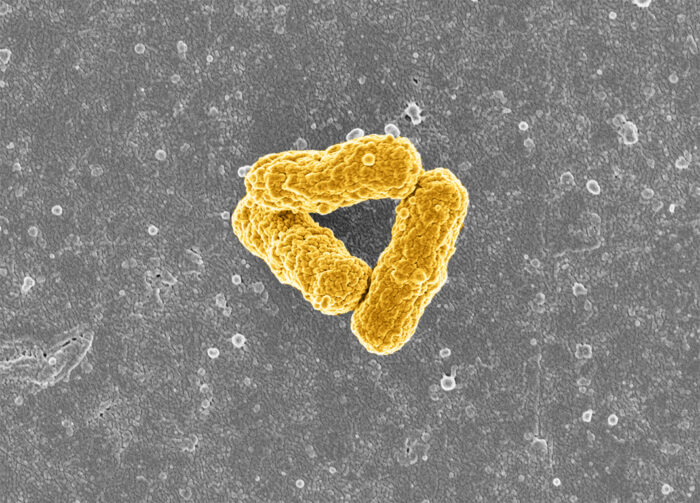New UK-based biotechnology company launched to scale and commercialise ground-breaking synthetic biology research of Jason Chin

Based in Cambridge, UK, Constructive Bio, the latest LMB spinout, aims to re-engineer biology, creating new classes of enzymes, drugs and biomaterials, building upon research and technologies developed by Jason Chin’s group in the LMB’s PNAC Division.
Jason’s group has made ground-breaking advancements in the development and application of techniques to reprogramme the genetic code of living organisms. After designing and synthesising the entire genome of the bacterium E. coli in 2019, Jason’s group further engineered this synthetic strain of E. coli, and last year published results showing that their reprogrammed cells could assemble polymers entirely from building blocks that are not found in nature. Furthermore, the modified bacteria were also resistant to a wide variety of viruses.
Constructive Bio has launched with $15 million seed investment and an exclusive licence from the Medical Research Council to IP developed by Jason’s group at the LMB. The Company will develop two platform technologies; large scale DNA assembly to build whole bacterial genomes from scratch, and genome reprogramming to engineer non-natural polymers for commercial applications.
Potential applications include novel therapeutics and antibiotics, enhanced agriculture, manufacturing and materials, and polymers that can be programmed to be biodegradable. In addition, the reprogrammed cells’ viral resistance can be used to increase bio-manufacturing yields for protein drug products such as insulin, which are routinely manufactured using E. coli bioreactors that are currently susceptible to contamination by phages (bacterial viruses).
The company was set up after seed funding led by Ahren Innovation Capital, with participation from Amadeus Capital Partners, OMX Ventures and General Inception. Jason will serve as Constructive Bio’s Chief Scientific Officer and will be joined by Dr Ola Wlodek as Chief Executive Officer.
Jason commented, “Over the last 20 years, we have created a cellular factory that we can reliably and predictably program to create new polymers. The range of applications for this technology is vast – using our approach we have already been able to program cells to make new molecules including from an important class of drugs and to program cells to make completely synthetic polymers containing the chemical linkages found in biodegradable plastics.
Now is the right time to commercialise these technologies. I am pleased that we have attracted significant support and seed funding to establish Constructive Bio and capture this opportunity. By taking inspiration from nature and reimagining what life can become we have the opportunity to build the sustainable industries of the future.”
The launch of Constructive Bio was covered by Clive Cookson, Science Editor at the Financial Times (N.B. a subscription is required to view Financial Times’ content).
Further references
Jason’s group page
Constructive Bio
‘Cambridge start-up aims to rewrite the code of life’ by Clive Cookson, Financial Times (N.B. requires subscription to view)
Previous Insights on Research
Cells reprogrammed for genetically encoded polymer synthesis and viral resistance
Creating an entire bacterial genome with a compressed genetic code